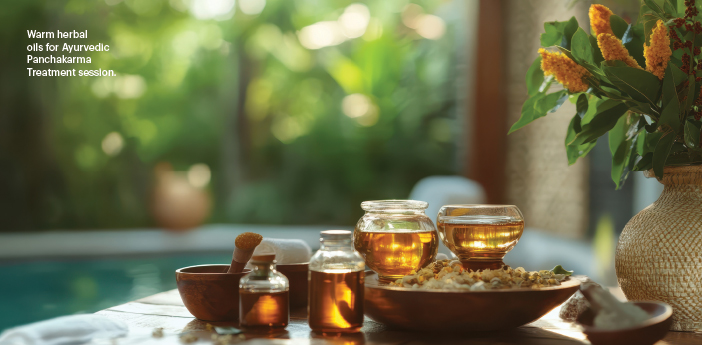Guest Editor’s Note: Ayurveda, the traditional medical system that originated in India, focuses on improving overall well-being through self-care, diet, and herbal formulations. There is a growing patient interest in using Ayurveda for symptom control and to improve quality of life. In this article, Krupali Desai, MD Ayurveda, MPH, and Jerrin Bawa, MBBS, summarize available evidence surrounding Ayurveda in oncology settings.

Krupali Desai, MD Ayurveda, MPH

Jerrin Bawa, MBBS
Overview
Ayurveda, an ancient traditional medical system from India, is grounded in the holistic understanding of health as a balance between body, mind, and spirit. Translated as knowledge of life—ayur (life) and veda (knowledge)—it is based on the idea that health and wellness depend on a balance between three fundamental biological energies (doshas). All individuals have a unique combination of these energies known as prakriti (innate constitution), which determines their physical, mental, and physiologic characteristics. Imbalance in these energies can manifest as disease. Based on individual body constitution and imbalances, Ayurveda emphasizes a highly personalized approach that includes diet and lifestyle modifications, self-care practices, daily and seasonal routines, mind-body practices, and herbal medicines to maintain or restore health.
Potential in Oncology Care
With growing global interest,1 Ayurveda has garnered attention for its potential contributions to oncology care.2,3Multiple plant-based compounds—such as those from Withania somnifera (Ashwagandha),4,5 Tinospora cordifolia (Guduchi),6 Phyllanthus emblica (Amla),7,8 Ocimum tenuiflorum (Tulsi),9,10 and Azadirachta indica (Neem)10—have demonstrated anticancer, antioxidant, and immunomodulatory properties. Of note, they have shown promise in treating melanoma, as they exhibit skin-protective effects, reduce ultraviolet-induced damage, and enhance tissue regeneration and have potential in mitigating treatment-related toxicities.11
“Although evidence for the use of Ayurvedic herbs in oncology care requires further scientific validation, personalized diet and lifestyle guidance rooted in Ayurvedic principles may offer valuable support in improving behavioral health....”— KRUPALI DESAI, MD AYURVEDA, MPH, AND JERRIN BAWA, MBBS
Tweet this quote
Additionally, compounds such as indole-3-carbinol (I3C), found in the spice cardamom, may induce apoptosis, arrest cell cycle, and downregulate oncogenic signaling pathways such as NF-κB (nuclear factor kappa) and BCL2. I3C has also been shown to enhance the efficacy of chemotherapeutic agents by modulating P-glycoprotein–mediated drug resistance.12 Another herb called Terminalia chebula (Haritaki), which contains a high concentration of ellagic acid, triggers mitochondrial apoptosis and PARP1 activation in cancer cells.13
Although clinical data are limited with these compounds, preliminary findings suggest potential benefits of Ayurvedic formulations as adjuvants to cancer treatments. For instance, a study involving 36 patients found that Rasayana Avaleha significantly reduced treatment-related side effects such as vomiting, mucositis, alopecia, and ageusia when administered along with conventional therapy.14 In another trial, patients who received Ayurvedic herbs during or after chemotherapy had improvements in nausea, fatigue, appetite loss, and quality of life.15

Over the past few years, curcumin has been studied extensively for its potential anticancer effects.16-18 In one study of patients with metastatic colorectal cancer, those receiving curcumin with FOLFOX (folinic acid, fluorouracil, oxaliplatin) had longer median progression-free survival (320 vs 171 days) and overall survival (596 vs 200 days) compared with patients who received FOLFOX alone. However, the small sample size and baseline differences between groups limit the interpretability of these results.19,20
A systematic review and meta-analysis found that turmeric (mouth wash/gel/oral treatments) improved oral mucositis in patients with head and neck cancer who had undergone radiation therapy or radiochemotherapy.21 Ginger has also been widely studied in patients receiving chemotherapy, with data showing it to be a safe adjuvant for chemotherapy-induced nausea and vomiting.22,23
Large, methodologically robust clinical trials are needed to validate the previously mentioned findings. However, challenges include standardizing herbal extracts, ensuring batch-to-batch consistency, and identifying active constituents.
Closing Thoughts on Behavioral Health
Although evidence for the use of Ayurvedic herbs in oncology care requires further scientific validation, personalized diet and lifestyle guidance rooted in Ayurvedic principles may offer valuable support in improving behavioral health, an increasingly recognized factor in cancer-related outcomes. Studies have shown that the Ayurvedic lifestyle and dietary interventions may be effective as adjuncts to conventional treatment of chronic conditions such as hypertension24 and diabetes.25 In addition, feasibility studies of Ayurveda and yoga-based programs indicate potential benefits for mental and physical well-being, weight management, and quality of life.26,27 In oncology settings, a pilot study of breast cancer survivors found improvements in emotional and cognitive functioning, symptom relief, and overall well-being with Ayurveda,28 suggesting it may offer a unique behavioral health framework within cancer survivorship care.
Guest Editor

Jun J. Mao, MD, MSCE
Dr. Mao is the Laurance S. Rockefeller Chair in Integrative Medicine and Chief of Integrative Medicine Service at Memorial Sloan Kettering Cancer Center, New York.
At Memorial Sloan Kettering Cancer Center, we have developed a 6-week virtual Ayurveda education program aimed at promoting health, enhancing quality of life, and supporting symptom management in patients affected by cancer. Grounded in Ayurvedic dietary and lifestyle principles, the program has been well received with high satisfaction and cross-cultural appeal among patients with cancer. We will evaluate both the qualitative and quantitative data to assess the impact of this program on behavioral changes and symptom management. This model may serve as a pathway for integrating traditional wisdom into modern cancer care, particularly to support the behavioral health and well-being of patients with cancer.
DISCLOSURE: Dr. Desai and Dr. Bawa reported no conflicts of interest.
REFERENCES
- Krishna S, Dinesh KS, Nazeema PK: Globalizing ayurveda: Opportunities and challenges. Int J Health Sci Res 10:55-68, 2020.
- Mao JJ, Pillai GG, Andrade CJ, et al: Integrative oncology: Addressing the global challenges of cancer prevention and treatment. CA Cancer J Clin 72:144-164, 2022.
- Arnold JT: Integrating ayurvedic medicine into cancer research programs part 1: Ayurveda background and applications. J Ayurveda Integr Med 14:100676, 2023.
- Chandran U, Patwardhan B: Network ethnopharmacological evaluation of the immunomodulatory activity of Withania somnifera. J Ethnopharmacol 197:250-256, 2017.
- Nisar MF, Wan C, Büsselberg D, et al: Current mechanistic insights into Withaferin A: A promising potential adjuvant anticancer agent from Withania somnifera. Naunyn Schmiedebergs Arch Pharmacol 398:3573-3593, 2025.
- Deepa B, Babaji HV, Hosmani JV, et al: Effect of Tinospora cordifolia-derived phytocomponents on cancer: A systematic review. Appl Sci 9:5147, 2019.
- Shafi L, Iqbal P: Indian gooseberry: Role in cancer prevention and treatment, in Macha MA, Zargar SM, Bhat AA, Uddin S (eds): Neglected and Underutilized Crops, pp 94-115. London; CRC Press; 2025.
- Sharma M, Pandey G, Verma KS: Antioxidant, immunomodulatory and anticancer activities of Emblica officinalis: An overview. Int Res J Pharm 2:38-42, 2011.
- Arya R, Faruquee H, Shakya H, et al: Harnessing the antibacterial, anti-diabetic and anti-carcinogenic properties of Ocimum sanctum Linn (Tulsi). Plants (Basel) 13:3516, 2024.
- Shukla DP, Shah KP, Rawal RM, et al: Anticancer and cytotoxic potential of turmeric (Curcuma longa), neem (Azadirachta indica), Tulasi (Ocimum sanctum) and ginger (Zingiber officinale) extracts on HeLa cell line. Int J Life Sciences Sci Res 2(10.21276), 2016.
- Aniqa A, Kaur S, Sadwal S: A review on the protective role of selected Ayurveda herbs against skin cancer. J Drug Res Ayurvedic Sciences 8:3-18, 2023.
- Dhanraj CB, Tanishka D, Gupta P: Role of Ayurveda in breast cancer treatment. Glob J Res Analysis 13(4), 2024.
- Khan MRUZ, Yanase E, Trivedi V: Extraction, phytochemical characterization and anti-cancer mechanism of Haritaki churna: An ayurvedic formulation. PLoS One 18:e0286274, 2023.
- Vyas P, Thakar AB, Baghel MS, et al: Efficacy of Rasayana Avaleha as adjuvant to radiotherapy and chemotherapy in reducing adverse effects. Ayu 31:417-423, 2010.
- Deshmukh V, Kulkarni A, Bhargava S, et al: Effectiveness of combinations of Ayurvedic drugs in alleviating drug toxicity and improving quality of life of cancer patients treated with chemotherapy. Support Care Cancer 22:3007-3015, 2014.
- Ravindran J, Prasad S, Aggarwal BB: Curcumin and cancer cells: How many ways can curry kill tumor cells selectively? AAPS J 11:495-510, 2009.
- Hasima N, Aggarwal BB: Cancer-linked targets modulated by curcumin. Int J Biochem Mol Biol 3:328-351, 2012.
- Cozmin M, Lungu II, Gutu C, et al: Turmeric: From spice to cure: A review of the anti-cancer, radioprotective and anti-inflammatory effects of turmeric sourced compounds. Front Nutr 11:1399888, 2024.
- Howells LM, Iwuji COO, Irving GRB, et al: Curcumin combined with FOLFOX chemotherapy is safe and tolerable in patients with metastatic colorectal cancer in a randomized phase IIa trial. J Nutr 149:1133-1139, 2019.
- James MI, Iwuji C, Irving G, et al: Curcumin inhibits cancer stem cell phenotypes in ex vivo models of colorectal liver metastases, and is clinically safe and tolerable in combination with FOLFOX chemotherapy. Cancer Lett 364:135-141, 2015.
- Wu CF, Wu HJ, Shih CL, et al: Efficacy of turmeric in the treatment of oral mucositis in patients with head and neck cancer after radiotherapy or chemoradiotherapy: A systematic review and meta-analysis. Front Pharmacol 15:1363202, 2024.
- Crichton M, Marshall S, Isenring E, et al: Effect of a standardized ginger root powder regimen on chemotherapy-induced nausea and vomiting: A multicenter, double-blind, placebo-controlled randomized trial. J Acad Nutr Diet 124:313-330.e6, 2024.
- Totmaj AS, Emamat H, Jarrahi F, et al: The effect of ginger (Zingiber officinale) on chemotherapy-induced nausea and vomiting in breast cancer patients: A systematic literature review of randomized controlled trials. Phytother Res 33:1957-1965, 2019.
- Sharma R, Goyal A, Singh R, et al: Effect of Ayurveda intervention in the integrated management of essential hypertension: A retrospective observational study. J Ayurveda Integr Med 12:521-528, 2021.
- Sharma R, Shahi VK, Khanduri S, et al: Effect of Ayurveda intervention, lifestyle modification and Yoga in prediabetic and type 2 diabetes under the National Programme for Prevention and Control of Cancer, Diabetes, Cardiovascular Diseases and Stroke (NPCDCS)-AYUSH integration project. Ayu 40:8-15, 2019.
- Rioux J, Howerter A: Outcomes from a whole-systems Ayurvedic medicine and yoga therapy treatment for obesity pilot study. J Altern Complement Med 25(S1):S124-S137, 2019.
- Rioux J, Thomson C, Howerter A: A pilot feasibility study of whole-systems Ayurvedic medicine and yoga therapy for weight loss. Glob Adv Health Med 3:28-35, 2014.
- Dhruva A, Wu C, Miaskowski C, et al: A 4-month whole-systems Ayurvedic medicine nutrition and lifestyle intervention is feasible and acceptable for breast cancer survivors: Results of a single-arm pilot clinical trial. Glob Adv Health Med 9:2164956120964712, 2020.
Dr. Desai is Project Coordinator of the Integrative Medicine Service at Memorial Sloan Kettering Cancer Center in New York. Dr. Bawa is a Research Fellow in the Integrative Medicine Service at Memorial Sloan Kettering Cancer Center in New York.
*MD Ayurveda: The Doctor of Medicine in Ayurveda (MD Ayurveda), or Ayurveda Vachaspati, is a 3-year Masters-level course in the alternative medical system of Ayurveda. The program is offered in some medical colleges in Sri Lanka and India.

